| Srl | Item |
| 1 |
ID:
149663


|
|
|
| 2 |
ID:
149659
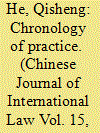

|
|
|
|
|
| Summary/Abstract |
This survey is composed of materials reflecting the practice of private international law in China in 2015. First, this survey covers the reports of the Supreme People’s Court (SPC) released in 2016, notably the Report on the Work of the SPC in 2015, which contains the statistics of the foreign-related civil or commercial cases accepted and concluded by Chinese courts. Second, the survey covers laws and judicial interpretations that were revised or took effect in 2015.
|
|
|
|
|
|
|
|
|
|
|
|
|
|
|
|
| 3 |
ID:
149648
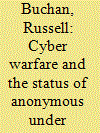

|
|
|
|
|
| Summary/Abstract |
Since its emergence in 2003 Anonymous has become an increasingly prominent actor on the international stage. Anonymous is an online collective comprising like-minded individuals that commit cyber-attacks against state and non-state actors that are allegedly involved in the abuse of fundamental human rights. In recent years Anonymous has demonstrated a preparedness to commit cyber-attacks against parties to an armed conflict and the cyber-attacks launched against Israel during its 2014 armed conflict with Hamas are such an example. Using Anonymous’s cyber-attacks against Israel as a lens, this article evaluates the status of online groups under international humanitarian law when they become embroiled in armed conflict and in particular under what circumstances members of these groups can be made the object of attack under the laws of targeting.
|
|
|
|
|
|
|
|
|
|
|
|
|
|
|
|
| 4 |
ID:
149655


|
|
|
|
|
| Summary/Abstract |
The necessity test in the GATT/WTO legal system has long been attacked on two grounds. First, the legal test formulated by the WTO Appellate Body to assess necessity has been described as ambiguous, illogical and arbitrary. Second, the WTO Appellate Body’s stringent interpretation of the necessity requirement has interfered with WTO Members’ domestic choices about policy objectives. This article revisits these conventional criticisms in the light of the recent WTO case law and attempts to make three claims in relation to the necessity test in WTO law. First, we now have a much clearer understanding of the role each element of the necessity test plays, how different elements interact and how to draw a conclusion after weighing and balancing these elements. Second, the WTO Appellate Body has gradually and substantially relaxed the necessity test over the past decade. It is no longer justifiable to depict the necessity test as a straightjacket. Third, the WTO Appellate Body has successfully pushed for a broad convergence in necessity tests across various WTO Agreements, despite their textual and structural differences.
|
|
|
|
|
|
|
|
|
|
|
|
|
|
|
|
| 5 |
ID:
149649
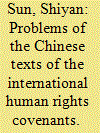

|
|
|
|
|
| Summary/Abstract |
This article re-examines the problems of the Chinese texts of the two International Covenants on Human Rights, which were raised 10 years ago and further dwelt upon by other scholars more recently. Each Covenant has a Chinese text that is different from the authentic Chinese text but has been prevailing in the United Nations human rights publications and in the People’s Republic of China. The appearance of the prevailing but invalid Chinese texts may well be attributed to the negligence of the United Nations in early 1970s. The People’s Republic of China has blindly trusted those United Nations publications and thus has always used the prevailing Chinese texts. Any inquiries of relevant matters must be done on an objective and impartial basis and in a logical and responsible way.
|
|
|
|
|
|
|
|
|
|
|
|
|
|
|
|
| 6 |
ID:
149657
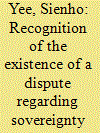

|
|
|
|
|
| Summary/Abstract |
This paper highlights the issue of the recognition of the existence of a dispute between China and Japan regarding sovereignty over Diaoyu Dao, identifies such a recognition, and comments on the implications flowing from that recognition for Japan and China, as well as for other States, especially the United States, and argues that in light of the well-known US position of taking no view on sovereignty over Diaoyu Dao, Article V of the US-Japan Mutual Cooperation and Security Treaty cannot apply to the island. Some comments are also offered on Japan’s “nationalization” and other measures and China’s response measures and/or counter-measures.
|
|
|
|
|
|
|
|
|
|
|
|
|
|
|
|
| 7 |
ID:
149646
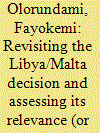

|
|
|
|
|
| Summary/Abstract |
In the Libya/Malta case, the ICJ held that where the area to be delimited between two opposite States measures less than 400 nautical miles, distance, not natural prolongation determines title to the continental shelf. This was the Court’s interpretation of the definition of the continental shelf in Article 76(1) of the Law of the Sea Convention and of the relationship between the continental shelf and the exclusive economic zone. In the East China Sea which measures less than 400 nautical miles, China relies on natural prolongation while Japan relies on the distance principle. This paper analyses the Libya/Malta decision to ascertain its correctness or otherwise, and its usefulness for resolving the East China Sea dispute. The central argument in this paper is that the decision is inapplicable to the East China Sea dispute because it is incompatible with Articles 76(1), 77(3) and 56(3) of the Law of the Sea Convention.
|
|
|
|
|
|
|
|
|
|
|
|
|
|
|
|
| 8 |
ID:
149651


|
|
|
|
|
| Summary/Abstract |
There has been an attempt to redefine the meaning of sovereignty in international legal discourse in the post-Cold War era. This attempt was essentially necessitated by a series of high-profile instances (including Somalia, Bosnia, Rwanda, Kosovo, Darfur) in which the United Nations/international community was seen as doing too little or (occasionally) too much when faced with grave humanitarian emergencies. Accordingly, sovereignty, one of the foundational principles of international law, came to be interpreted as a two-way street conferring rights on States, while at the same time imposing a set of duties on them. This idea is couched in the doctrine of “Responsibility to Protect” (or as it has come to be known—R2P) which was formally endorsed at the UN World Summit 2005. The UN Security Council has invoked this doctrine numerous times in its resolutions over the years. Against this background, the central aim of this article is to examine the legal status of the doctrine of Responsibility to Protect under international law. While claiming that R2P is a new face of the old liberal doctrine of humanitarian intervention, the article will argue that R2P is neither a law nor a legally binding framework and that there are grave ambiguities in terms of its specific normative contents. It will demonstrate that R2P (at the very least its military aspects) does not enjoy consensus either in principle or in practice, and that its international legal implications are not immediately clear. From this analysis the article would conclude that R2P is yet to find its legal feet in the practice of States, particularly the Asian-African States and that if the international community is to take human suffering seriously and address it with timely and effective collective action, democratization of the Security Council should take place as a matter of urgent priority.
|
|
|
|
|
|
|
|
|
|
|
|
|
|
|
|
| 9 |
ID:
149660


|
|
|
|
|
| Summary/Abstract |
To reaffirm China’s territorial sovereignty and maritime rights and interests in the South China Sea, enhance cooperation in the South China Sea with other countries, and uphold peace and stability in the South China Sea, the Government of the People’s Republic of China hereby states as follows:
|
|
|
|
|
|
|
|
|
|
|
|
|
|
|
|
| 10 |
ID:
149661


|
|
|
|
|
| Summary/Abstract |
With regard to the award rendered on 12 July 2016 by the Arbitral Tribunal in the South China Sea arbitration established at the unilateral request of the Republic of the Philippines (hereinafter referred to as the “Arbitral Tribunal”), the Ministry of Foreign Affairs of the People’s Republic of China solemnly declares that the award is null and void and has no binding force. China neither accepts nor recognizes it.
|
|
|
|
|
|
|
|
|
|
|
|
|
|
|
|